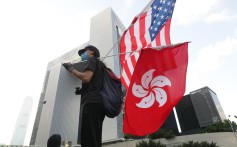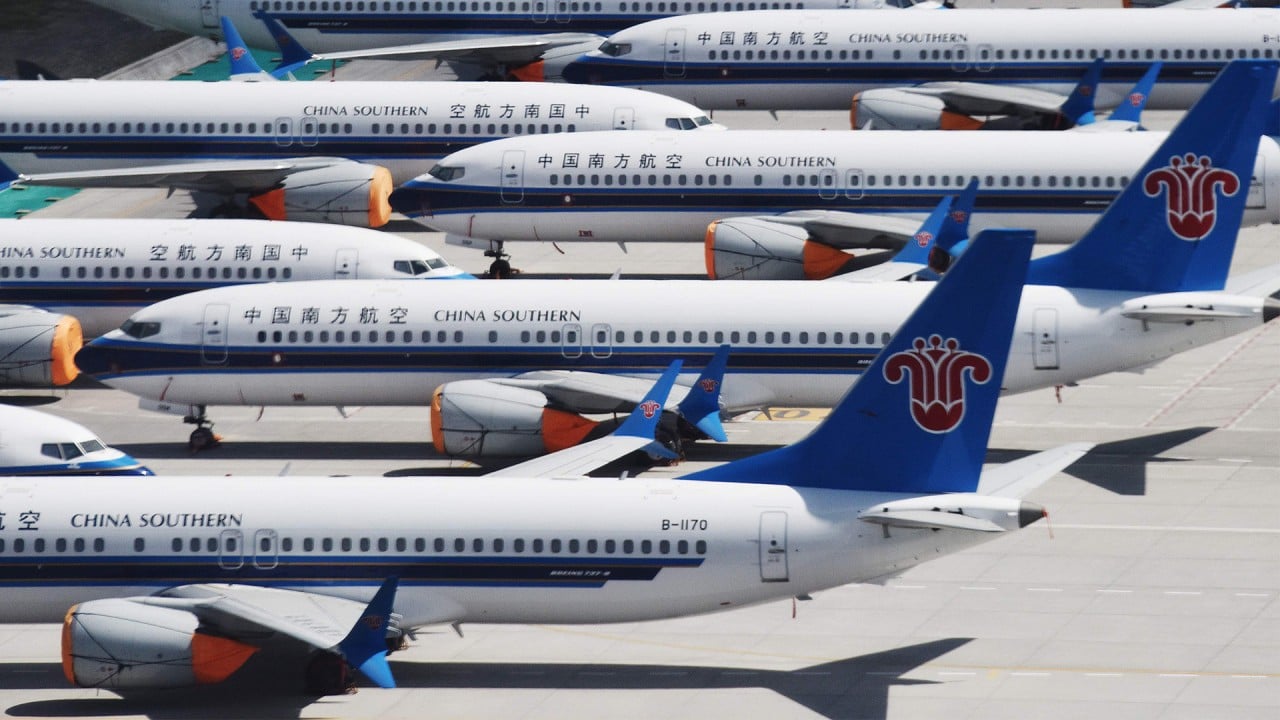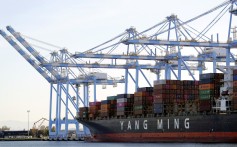Must the United States demonise China?
Simply existing as a prosperous power is enough to make China an enemy, which must be isolated, contained, if not destroyed, like a disease. Hong Kong is but another factor in this hegemonic calculus

Alex Lo
SCMP Columnist
My Take by Alex Lo
Simply existing as a prosperous power is enough to make China an enemy, which must be isolated, contained, if not destroyed, like a disease. Hong Kong is but another factor in this hegemonic calculus

Alex Lo
SCMP Columnist
My Take by Alex Lo
Published: 26 Jun, 2020
America has always needed an enemy. China is but the latest in a long series of “monsters” in need of destruction. What Adams, the sixth US president, famously warned against has long ago become the blueprint for the United States’ engagement with the world.
Every post-war president, including Donald Trump, went into office trying to follow Adams’ wise advice but ended up doing the opposite. When you have a democracy, public opinion must be managed or manufactured.
US Senate passes bill to punish China for Hong Kong national security law
26 Jun 2020


When you run a national security state, you must control your own citizens domestically and use all your powers, hard, soft and sharp, to bring to heel allies and rivals alike. Disobedience demands punishment, which can range from relatively bloodless sanctions to outright invasion and war.
When your military is deployed in more than 150 countries in a world that has fewer than 200, you are running a global empire, regardless of what fanciful claims you make to justify their worldwide presence. Simply existing as a rising power – like China – is enough to make someone an enemy, which must be isolated, demonised, contained, if not destroyed. Hong Kong is but another factor in this hegemonic calculus.
But to create an enemy, your opposing entity has to behave like one, or openly declare itself as one. Here’s the problem for Washington. China doesn’t want to be an enemy
That’s why frustrated American politicians are poking and provoking Beijing at every opportunity. China has so far refused to take the bait. But for how long? The answer to that question will determine the war and peace, and poverty and prosperity, of this century.
Who’s a ‘bad actor’ on the world stage?
Washington says it’s China but, from arms control to human rights, America poses a far greater threat

Alex Lo
Published: 16 Jun, 2020
US Secretary of State Mike Pompeo has slammed China for the umpteenth time for being “a bad actor”, by which he didn’t mean the Hollywood variety. China is no angel. But that pernicious title more appropriately belongs to the United States.
This conclusion can be justified by looking at not what officials like Pompeo say but what they do in terms of international law, treaties and norms.
Washington is expected to pull out of the 35-nation, 20-year-old Open Skies treaty allowing unarmed surveillance flights at short notice over member countries. Last year, it withdrew from the 1987 Intermediate-Range Nuclear Forces Treaty as well as the Arms Trade Treaty, set by the United Nations.
The latter regulates the transfers of conventional arms and has long been the target of the right-wing National Rifle Association, the main barrier to proper gun control legislation within the US. Together, they amount to the greatest assault on global arms control in recent years. The US, of course, unilaterally broke off the Iran nuclear deal.

Trump administration bans Chinese passenger airlines from flying to US destinations
US President Donald Trump and Pompeo have been criticised for making Washington an unreliable international partner. But they are merely continuing a long US tradition.
According to Human Rights Watch, these are commonly accepted international human rights treaties that the US has ignored: Convention on the Elimination of All Forms of Discrimination against Women; Convention on the Rights of the Child; Convention for the Protection of all Persons from Enforced Disappearance; Mine Ban Treaty; Convention on Cluster Munitions; Convention on the Rights of Persons with Disabilities and Optional Protocol; and the Convention against Torture.
Of the 18 human rights agreements under the UN, America has only ratified five. Even China has done eight.
Trade war cost US firms US$1.7 trillion in market value, New York Fed says
30 May 2020


But, in light of the latest development, Washington’s rejection of the International Criminal Court is especially relevant. China, too, has not signed on to the ICC but continues to be officially engaged with it.
The Trump White House has just imposed sanctions on ICC officials for investigating whether US forces committed war crimes in Afghanistan.
Pompeo has called the ICC a “kangaroo” court. Incredibly, he said the latest sanctions could also apply to the family members of ICC officials. Don Corleone in the Godfather would have been proud.
Intriguingly, Washington thinks it can sanction China for allegedly breaching a bilateral treaty, the Joint Declaration with Britain over Hong Kong, to which it is not even a party. Guess if you can sanction the ICC, you can sanction anyone!
This article appeared in the South China Morning Post print edition as: Who’s a ‘bad actor’ on the world stage?
Alex Lo has been a Post columnist since 2012, covering major issues affecting Hong Kong and the rest of China. A journalist for 25 years, he has worked for various publications in Hong Kong and Toronto as a news reporter and editor. He has also lectured in journalism at the University of Hong Kong.
“She goes not abroad, in search of monsters to destroy. She is the well-wisher to the freedom and independence of all. She is the champion and vindicator only of her own. She will commend the general cause by the countenance of her voice, and the benignant sympathy of her example. She well knows that by once enlisting under other banners than her own, were they even the banners of foreign independence, she would involve herself beyond the power of extrication, in all the wars of interest and intrigue, of individual avarice, envy, and ambition, which assume the colours and usurp the standard of freedom.
“The fundamental maxims of her policy would insensibly change from liberty to force … She might become the dictatress of the world. She would be no longer the ruler of her own spirit …” – John Quincy Adams, 1821
America has always needed an enemy. China is but the latest in a long series of “monsters” in need of destruction. What Adams, the sixth US president, famously warned against has long ago become the blueprint for the United States’ engagement with the world.
Every post-war president, including Donald Trump, went into office trying to follow Adams’ wise advice but ended up doing the opposite. When you have a democracy, public opinion must be managed or manufactured.
US Senate passes bill to punish China for Hong Kong national security law
26 Jun 2020

When you run a national security state, you must control your own citizens domestically and use all your powers, hard, soft and sharp, to bring to heel allies and rivals alike. Disobedience demands punishment, which can range from relatively bloodless sanctions to outright invasion and war.
When your military is deployed in more than 150 countries in a world that has fewer than 200, you are running a global empire, regardless of what fanciful claims you make to justify their worldwide presence. Simply existing as a rising power – like China – is enough to make someone an enemy, which must be isolated, demonised, contained, if not destroyed. Hong Kong is but another factor in this hegemonic calculus.
But to create an enemy, your opposing entity has to behave like one, or openly declare itself as one. Here’s the problem for Washington. China doesn’t want to be an enemy
That’s why frustrated American politicians are poking and provoking Beijing at every opportunity. China has so far refused to take the bait. But for how long? The answer to that question will determine the war and peace, and poverty and prosperity, of this century.
Who’s a ‘bad actor’ on the world stage?
Washington says it’s China but, from arms control to human rights, America poses a far greater threat

Alex Lo
Published: 16 Jun, 2020
US Secretary of State Mike Pompeo has slammed China for the umpteenth time for being “a bad actor”, by which he didn’t mean the Hollywood variety. China is no angel. But that pernicious title more appropriately belongs to the United States.
This conclusion can be justified by looking at not what officials like Pompeo say but what they do in terms of international law, treaties and norms.
Washington is expected to pull out of the 35-nation, 20-year-old Open Skies treaty allowing unarmed surveillance flights at short notice over member countries. Last year, it withdrew from the 1987 Intermediate-Range Nuclear Forces Treaty as well as the Arms Trade Treaty, set by the United Nations.
The latter regulates the transfers of conventional arms and has long been the target of the right-wing National Rifle Association, the main barrier to proper gun control legislation within the US. Together, they amount to the greatest assault on global arms control in recent years. The US, of course, unilaterally broke off the Iran nuclear deal.

Trump administration bans Chinese passenger airlines from flying to US destinations
US President Donald Trump and Pompeo have been criticised for making Washington an unreliable international partner. But they are merely continuing a long US tradition.
According to Human Rights Watch, these are commonly accepted international human rights treaties that the US has ignored: Convention on the Elimination of All Forms of Discrimination against Women; Convention on the Rights of the Child; Convention for the Protection of all Persons from Enforced Disappearance; Mine Ban Treaty; Convention on Cluster Munitions; Convention on the Rights of Persons with Disabilities and Optional Protocol; and the Convention against Torture.
Of the 18 human rights agreements under the UN, America has only ratified five. Even China has done eight.
Trade war cost US firms US$1.7 trillion in market value, New York Fed says
30 May 2020

But, in light of the latest development, Washington’s rejection of the International Criminal Court is especially relevant. China, too, has not signed on to the ICC but continues to be officially engaged with it.
The Trump White House has just imposed sanctions on ICC officials for investigating whether US forces committed war crimes in Afghanistan.
Pompeo has called the ICC a “kangaroo” court. Incredibly, he said the latest sanctions could also apply to the family members of ICC officials. Don Corleone in the Godfather would have been proud.
Intriguingly, Washington thinks it can sanction China for allegedly breaching a bilateral treaty, the Joint Declaration with Britain over Hong Kong, to which it is not even a party. Guess if you can sanction the ICC, you can sanction anyone!
This article appeared in the South China Morning Post print edition as: Who’s a ‘bad actor’ on the world stage?
Alex Lo has been a Post columnist since 2012, covering major issues affecting Hong Kong and the rest of China. A journalist for 25 years, he has worked for various publications in Hong Kong and Toronto as a news reporter and editor. He has also lectured in journalism at the University of Hong Kong.
No comments:
Post a Comment